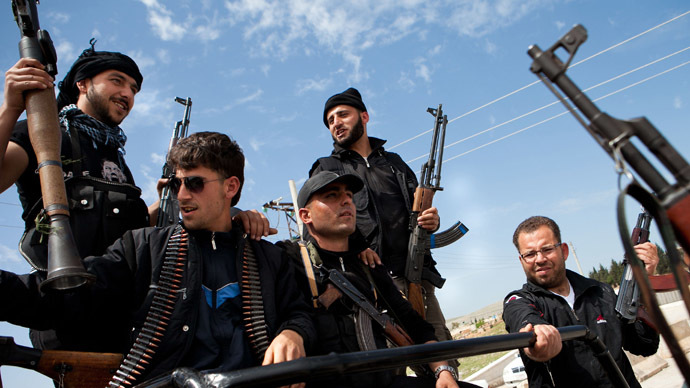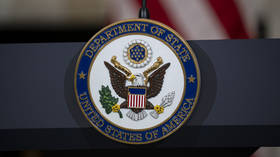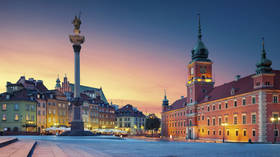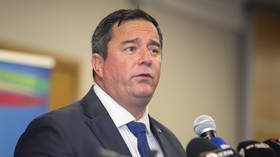‘They are killing each other’: Western weapons for Syrian rebels will intensify war

The US decision to arm the Syrian rebels fighting government troops has sparked feuds among various rebel factions dominated by radical Islamist fighters. RT contributor Afshin Rattansi warns against the move, as internal schisms among the rebels deepen.
A power struggle may also be brewing in the rebels’ ranks: Fighters from the Al-Qaeda-linked Al-Nusra Front have reportedly assassinated a large number of officers of the Free Syrian Army.
RT:The Al-Qaeda-linked Al-Nusra Front is now said to be targeting Free Syrian Army (FSA), but these two share a common goal – to oust Syrian President Bashar Assad. Is there some sort of power struggle we are seeing within the rebel ranks?
Afshin Rattansi: The rebel ranks were in Istanbul recently, where they could make no type of agreement between themselves. Now they are actually killing each other. This power struggle has been going on for months and months.
And presumably President Obama and the NATO powers are saying that they will give weapons to the Free Syrian Army. Well, if Al-Nusra Front is murdering members of the Free Syrian Army, then presume they take some of those arms and use them. Disunity in the rebel ranks is high, and is now extending to attacking Kurds in the northern part of Syria.
RT:Reports say that many FSA fighters are leaving more modern brigades for hard-line groups. What are the dangers of that, and why are they doing it?
AF: The dangers are everywhere to be seen in neighboring Iraq and Lebanon, as the Al-Nusra Front becomes the lead faction in the opposition. No amount of arming the so-called ‘moderate rebels’ is going to work against the hundreds or thousands, millions or billions – we don’t know – coming from Qatar and Saudi Arabia, the American allies in the Persian Gulf.
So, the dangers are everywhere to be seen. Another danger is the blowback that is occurring even now, with some of those militants returning to their home countries in Europe and perhaps to the US to fight their jihad on European and American soil.
RT:Any clearer about who or what is actually making up the FSA?
AF: The Free Syrian army seems to have deposed some of the initial leaders, but rather like the pre-Iraq-War time, we don’t really know. It isn’t stopping the Americans. They seem to know exactly who the Free Syrian Army is, and they have 2,000 marines over the Jordanian border putting in Patriot missiles and getting ready for war. They were flying F-16s over the past 48 hours.
France does not seem to know who the FSA is either, as Paris is saying “no more arms, no more weapons, until we find out who the personnel really are in this rebel movement.”
RT:What is the right way forward here with the rebels calling on Western backers to send in weapons?
AF: The right way of going about it in Syria is keeping money on the humanitarian groups that are going to help the refugees. The US should be bombing Syria not with weapons, but with airlifts of medicine and urgent medical care for all of these millions of refugees.
Syria already had a refugee crisis in the fallout of the Iraq war, and it has its own one now. So the way forward is to pour humanitarian aid into the country, and of course get those talks going in Geneva. Hopefully, all sides will be talking soon without the preconditions of this loose coalition of rebels.
The statements, views and opinions expressed in this column are solely those of the author and do not necessarily represent those of RT.













